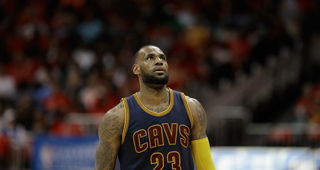Charles Barkley doesn’t put his chin out there so much as he’s all chin. That’s not a fat joke. What NBA fans like and loathe about the Chuckster is that he puts himself out there, not in the cynical Baylessian sense, but in the way a charming nut at the end of the bar might. He has some bonkers views on basketball, politics, and culture, and he doesn’t have any trepidation about sharing them. Barkley is not a great thinker, or even a particularly informed one. You’ll remember he dismissed analytics a couple years back while simultaneously betraying that he hasn’t ever sought to understand them, and more insidiously, in the wake of Michael Brown and Eric Garner’s deaths at the hands of police who were, at best, extremely overzealous, he argued inartfully on CNN that cops are awesome. He can be funny and bracingly honest, but he’s also wrong a lot.
Northeast Ohio has more or less gotten over The Decision, but Chuck hasn’t, invoking it as recently as last summer, on Bill Simmons’ short-lived Any Given Wednesday, to half-assedly make the case that LeBron James could never be top-five all-time because he teamed up with Chris Bosh and Dwyane Wade in South Beach. Barkley likes to portray LeBron as entitled and temperamental—a great player, but not quite a killer like Michael Jordan. He pushed that narrative a few inches further last week, characterizing LeBron’s latest bit of public grousing about the Cavs’ thin roster as inappropriate and whiny.
LeBron is almost always exceedingly measured with the media and plays off a lot of incoming fire with non-answers and cliché, but he’s in no type of mood for foolishness these days. After Monday's loss to the Mavericks, LeBron took Barkley apart, calling him out for joking and laughing with Jordan during the ‘93 Finals—oh, but nobody were friends back then, he sneered—and contrasting his own mostly model professionalism with Barkley throwing a guy through a barroom window in 1997 and showing up to All-Star events hungover. It’s about as angry as LeBron has ever been in public, excluding every time Mario Chalmers missed a rotation.
It’s difficult to say with much certainty when LeBron is being honest. He’s graduated from the Kobe Bryant school of personal brand management. Even when he’s speaking his mind, it’s usually toward achieving some end or another, or trying to get press and fans to see him a certain way. His life is a commercial for LeBron James. You can see him, anywhere and everywhere, but he’s untouchable. The best way to understand him is through interpretation. The author is dead, to coin a phrase—you can’t trust him when he tells you what he means.
I return often to this Alex Pappademas piece, where he uses a publishing-his-notes schema to chronicle a heavily mediated interview with Cameron Diaz at the Beverly Hills Four Seasons. Nothing terribly interesting happens for paragraphs and paragraphs, and the conversation with Diaz is hardly illuminating, then the piece ends with a scene of Pappademas, Diaz, and a publicist stuck in an elevator waiting area making awkward chit-chat about the possibly fake potted plants a few feet away from them, and Pappademas realizes this is the only truly human moment he’s shared with Diaz in the twenty-five or so minutes they’ve spent in each other’s company. Many things that seem fake are probably real, deep down, he concludes, which is about as succinct an explanation of celebrity culture and the actual people swallowed by the fog of it as I’ve ever read.
LeBron going off on Barkley is both more spectacular and less authentic than Cameron Diaz disengaging interview mode and making small talk about silk vs. organic plants. LeBron doesn’t forget himself around journalists, and one of the first words in his outburst was legacy, but it’s confirmation that being LeBron James is as constantly aggravating as it looks from a distance. He dragged undermanned Cavs teams deep into the playoffs year after year, won two titles in Miami with the rest of the league hating him, returned to Cleveland with Pat Riley grumbling about his manhood, and beat the 73-win Warriors last year in the Finals only to watch them add the second-best player in the league over the summer. He’s had his mishaps and failures, but he’s never done anything wrong, really. So why is he catching flak for lobbying his front office for bench help? For that matter, how did he earn Phil Jackson’s side-eye? Whatever he does, it’s not good enough for everyone, and that clearly bothers him.
If the language of his rant is a little studied—LeBron may have taken some time to think up a couple of those digs, though he does have a famously sharp memory—the emotion behind it is pure. It’s late January and the Cavs are hiccuping and he’s leading the league in minutes. He’s 32 and sensing the end of his prime. The anger is real, and LeBron is stingy with realness. A sharp burst of rage that is, as ever, slightly operatic and calculated, is about as close as he comes to letting us in. If it scans as oversensitivity or baseless complaint to some, so be it. For once, LeBron doesn’t seem to care.



